General
The 19th RUFORUM AGM in Yaoundé calls for consolidated efforts towards transforming higher agricultural & tertiary education to contribute to sustainable development & food security in Africa
Published
2 years agoon
By
Mak Editor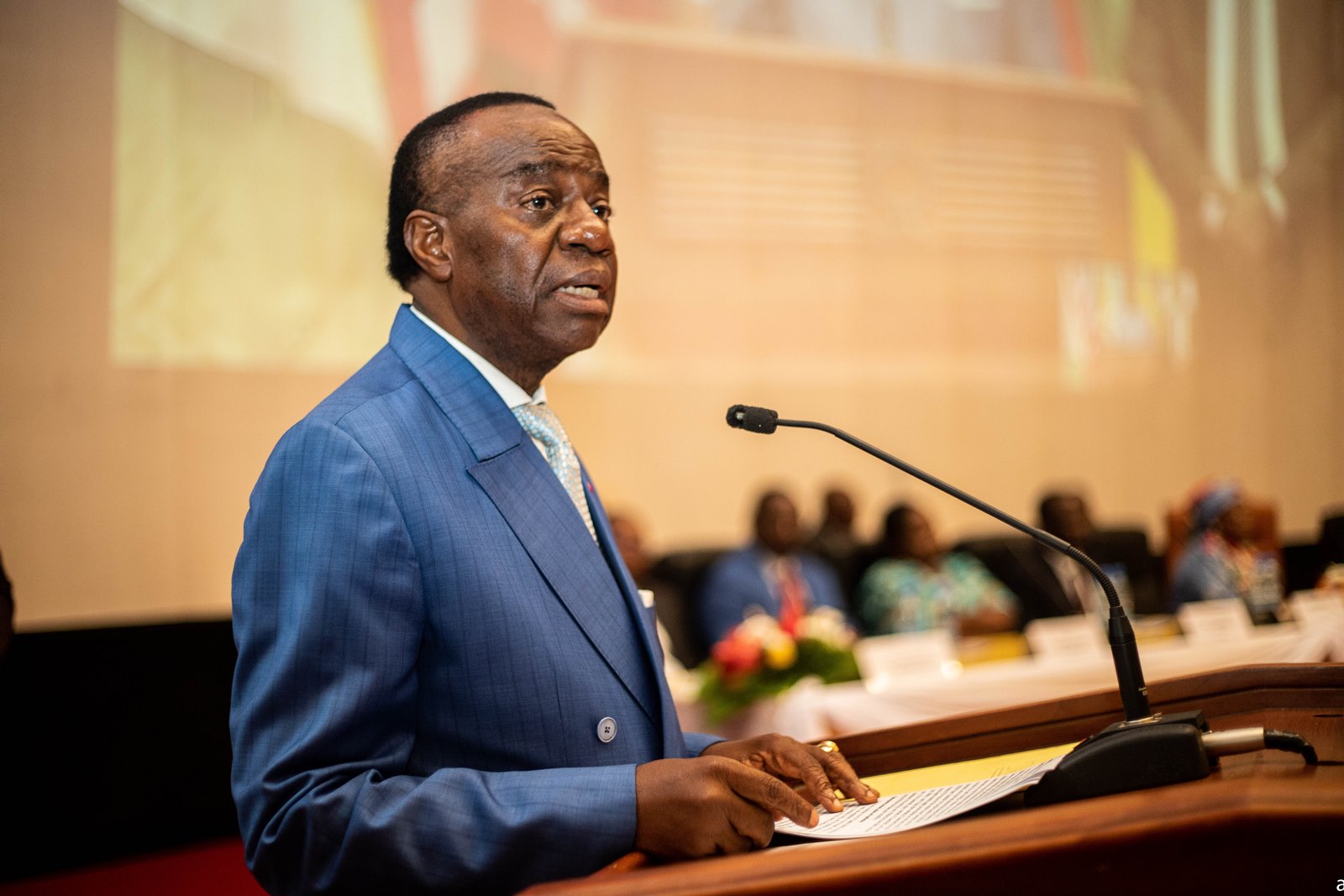
The Regional Universities Forum for Capacity Building in Agriculture (RUFORUM), a consortium of 163 universities in 40 African countries held its 19th Annual General Meeting at the Palais De Congres in Yaoundé, Cameroon from 28th October to 2nd November 2023. The first of its kind in West and Central Africa, the RUFORUM AGM 2023 provided an opportunity for over 600 delegates from Africa and beyond including; Ministers, Development Partners, University leaders, students, private sector leaders; farmers and farmer representatives; emerging and early career researchers as well as other key stakeholders in agriculture and higher education to share experiences and chart a way forward for transforming higher agricultural and tertiary education to contribute to sustainable development in Africa under the theme: Transforming Higher Education to Sustainably Feed and Create Prosperity for Africa.
Officially opened by His Excellency Paul Biya, President of the Republic of Cameroon, represented by Professor Jacques Fame Ndongo, Cameroon’s Minister of State, Minister of Higher Education, the 19th RUFORUM Annual General Meeting in Yaoundé provided a platform for participants to deliberate on key strategies for transforming higher agricultural and tertiary education to contribute to national, continental and global development as well as building consensus among key stakeholders in agriculture and higher education on the actions required to strengthen the role and/or integration of universities in agricultural and national development processes in line with the aspirations of the African Union Agenda 2063 ‘The Africa We Want’.
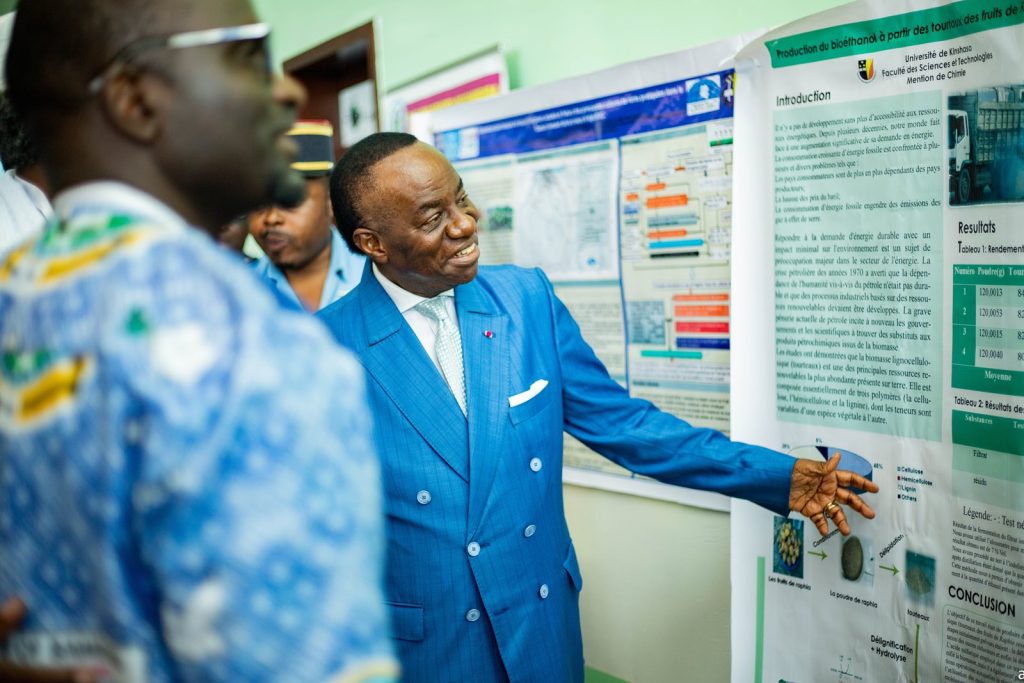
In a speech presented by Professor Jacques Fame Ndongo at the official opening ceremony, His Excellency Paul Biya, President of the Republic of Cameroon stressed RUFORUM’s significant efforts to support the African Union Agenda 2063 when he said, “RUFORUM’s vision 2030, makes the body a significant contributor to transformation of Africa and vehemently seeks to harness the discovery, engagements and learning of vibrant transformative universities to catalyze sustainable, inclusive agricultural development to feed and create prosperity for Africa.”
According to him, it is worth indicating that agriculture in Africa should be understood in its broadest sense to include but not limited to animal and crop production, livestock, wild life, fisheries and forestry. Hence RUFORUM’s mission since its inception in 2004, of strengthening the capacities of universities to foster innovation responsive to demands of small holder farmers through the training of higher quality researchers, the output of impact-oriented research and maintenance of collaborative working relations among researchers, farmers, national agricultural research institutions, the Private sector and government is worthy prioritizing.
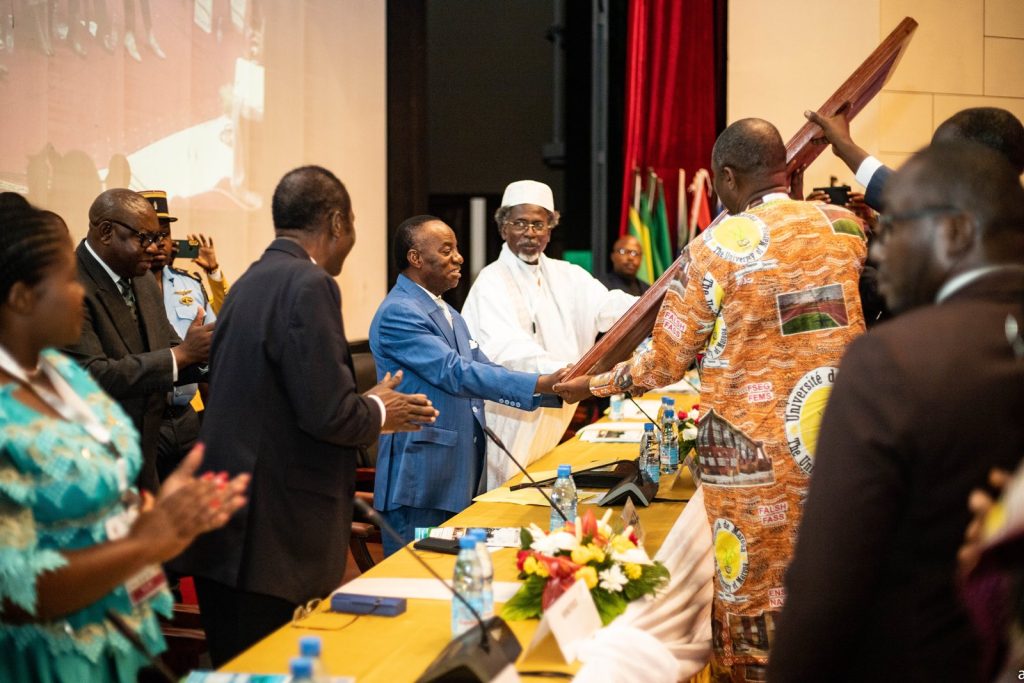
He called upon participants to use the meeting forum to change the face and image of the African continent through constructive and fruitful deliberations on agricultural production, food safety research and better health food security. To him the RUFORUM AGM is a bigger opportunity to think and act, make proposals, formulate recommendations and necessary resolutions which if acted on can change the face of the African continent.
“This is the turning point for the African continent to think big and have the courage to dream big. This is our opportunity to make a difference in our world. This is the opportunity Africa needed to change the target of its demand of action. We have to mutualize and federate our actions and voices in the interest of a united, strong and prosperous Africa,” he said.
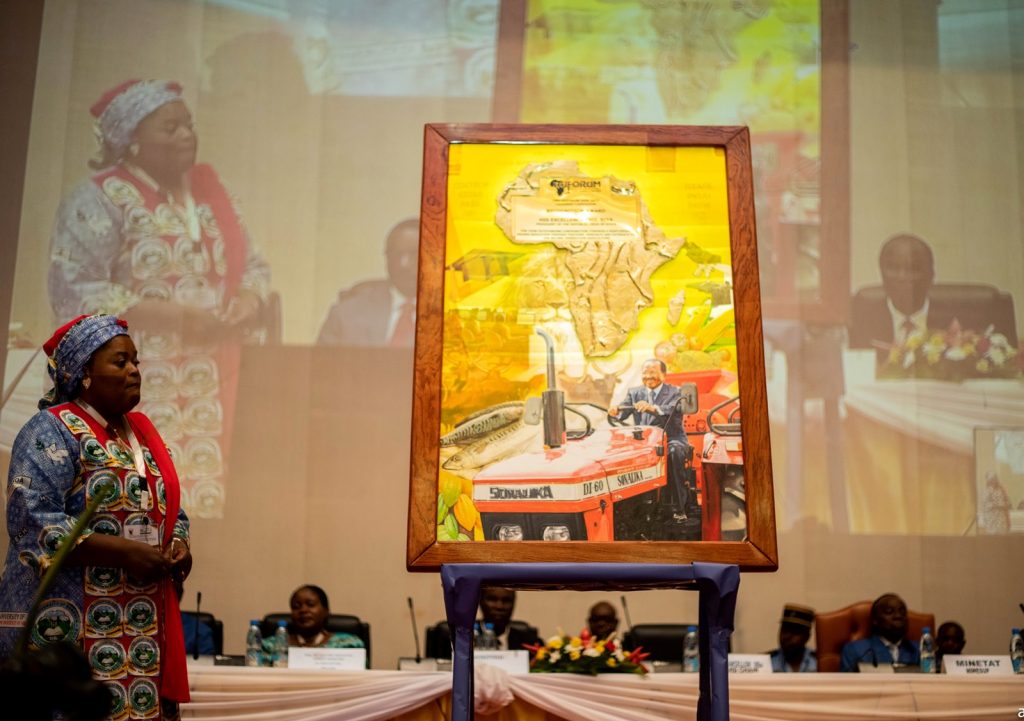
The 19th RUFORUM Annual General Meeting carried a unique vibrant turn as being the first to be held in West and Central Africa. The weeklong event broke the record as the most and well attended ever with over 600 participants across the region as well as international delegates. The colorful event was embroiled with informative, constructive, edutainment activities in form of pre-AGM events, side events, Business Meetings, capacity building and mentoring sessions, scientific conferences, poster sessions and exhibitions well aligned to key thematic areas as well as the AGM theme: Transforming Higher Education to Sustainably Feed and Create Prosperity for Africa.
Additionally, high-level policy dialogues with Ministers, Senior Government Leaders and Development Partners were held to review the finance and other resource mobilization strategies as well as following up on the actualization of the available national, regional and global policies geared towards higher education transformation and ensuring of food security in Africa.
Speaking at the Opening Ceremony, Prof. Theresia Nkuo-Akenji, the RUFORUM Board Chair and Vice Chancellor University of Bamenda thanked His Excellence Paul Biya and the Government of Cameroon for accepting to host the 19th RUFORUM Annual General Meeting and equally appreciated the financial support towards the same cause.
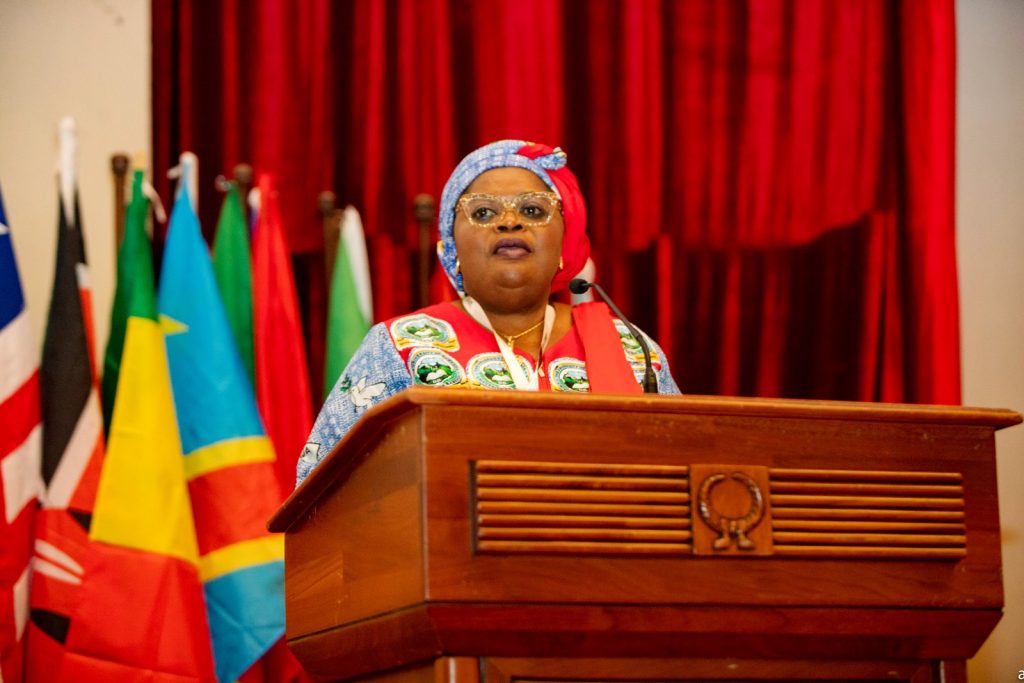
In a special way, Prof. Theresia Nkuo-Akenji thanked the Ministry of State for Higher education and all the sister ministries of Government of Cameroon that worked hard to see to it that the 19th RUFORUM AGM is a success. Equally, the Board Chair, extended her sincere gratitude to the people of Cameroon for the warm reception and support.
“My special tribute goes to the members of AGM 2023 Sub committees. You have indeed done a great job throughout the ten months of organizing this significant event. On behalf of RUFORUM Network, I thank you. To the RUFORUM Secretariat under the dynamic leadership of Prof. Patrick Okwori, accept our immense gratitude for your strong determination and dedication,” she gratefully said.
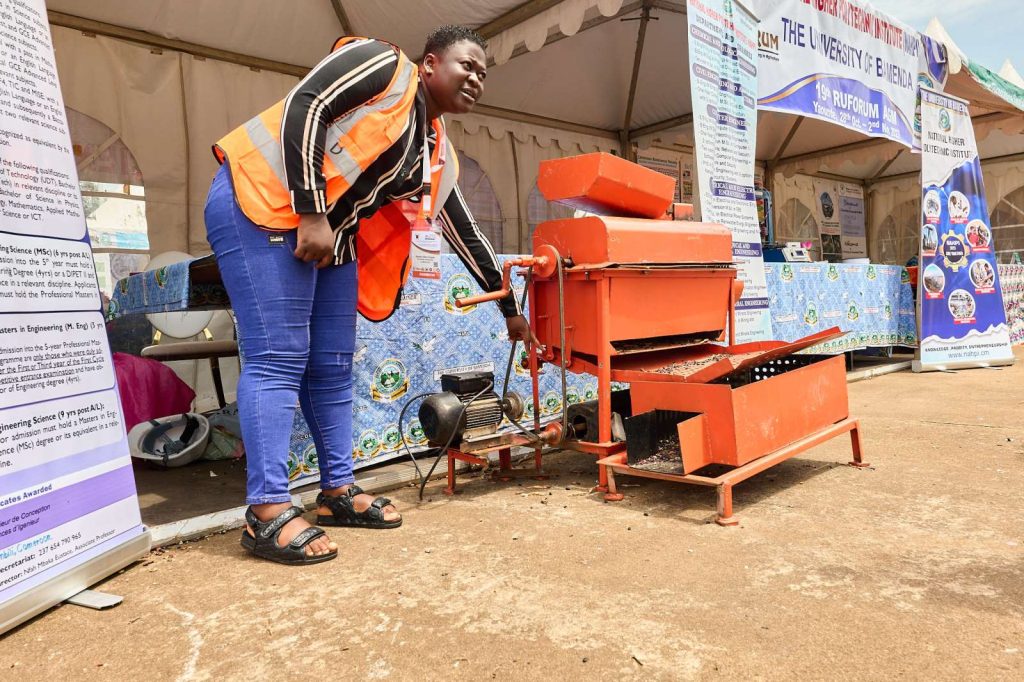
She recognized the tremendous achievements and developments aligned to RUFORUM’s nineteen years (19) of existence noting that the strong network has wisely selected its priority areas of focus to transform higher education and agricultural sector in Africa as;
- Reform the training agenda for Africa to meet the development needs
- Entrepreneurship and business incubation for wealth creation
- Research for Development and wealth creation
- Partnerships for scale and impact
“As African people, permit me to use the adage of a broom; it is easy to break a single broom piece but when you combine several small brooms together they then make a broom stack that will not be easy to break. The collective power that RUFORUM has put together through 163 universities from across 40 countries bears such strength. The Vice Chancellors gathered here today remain committed to the core values and foundations of the network. To illustrate this Your Excellency, each of the Vice Chancellors meet their own costs of participation.” She happy said.
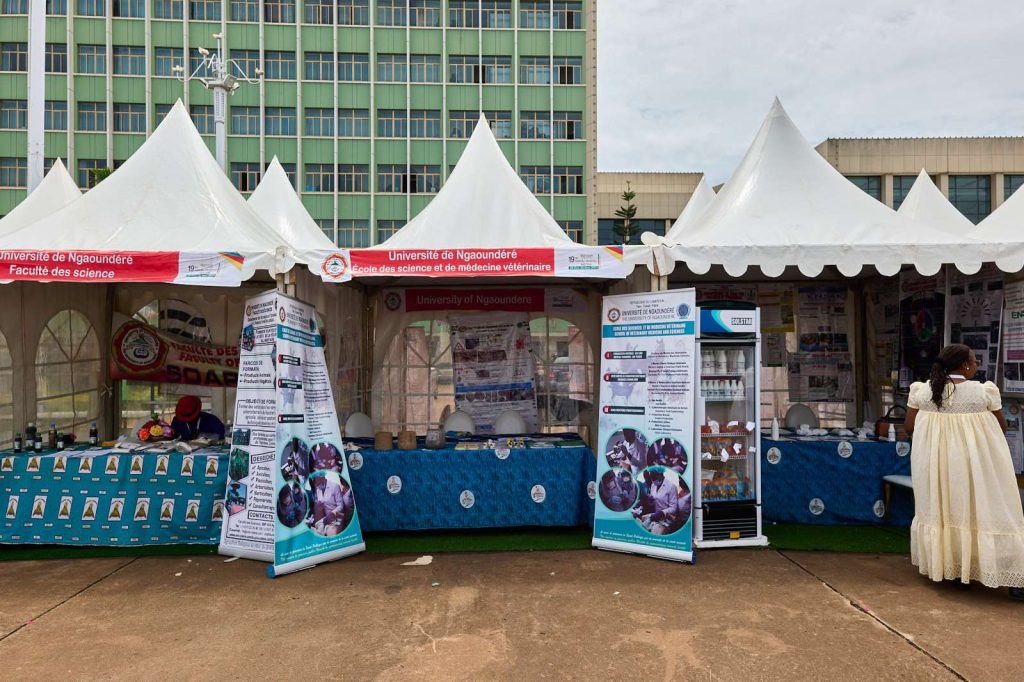
In the same spirit the RUFORUM Executive Secretary Prof. Patrick Okori deeply thanked the host Universities that is, University of Bamenda, University of Ngaoundere, University of Dschang, University of Buea and University of Maroua under the strong and able leadership of the RUFORUM Board Chair, Prof. Theresia Nkuo-Akenji for successfully hosting the 19th RUFORUM Annual General Meeting.
He also recognized the Former Vice Chancellor of University of Ngaoundere Prof. Florence Uphie Chinje Melo who heavily supported the AGM preparations. He was astonished with the presence of the Africa Development Bank, MasterCard Foundation, research international communities, RUFORUM for Agricultural Research in Africa, the Africa Forum for Agricultural Advisory Services, sub regional Agricultural organizations such as the Association for Strengthening Agricultural Research in Eastern and Central Africa (ASARECA), the Centre for Coordination of Agricultural Research and Development for Southern Africa (CCARDESA) and the West and Central African Council for Agricultural Research and Development (CORAF).
“You have all provided support for this engagement, thank you very much. Together we will continue this journey of transforming Africa’s Agricultural and higher education to produce human resources and development solutions that Africa and indeed the world needs,” he said.
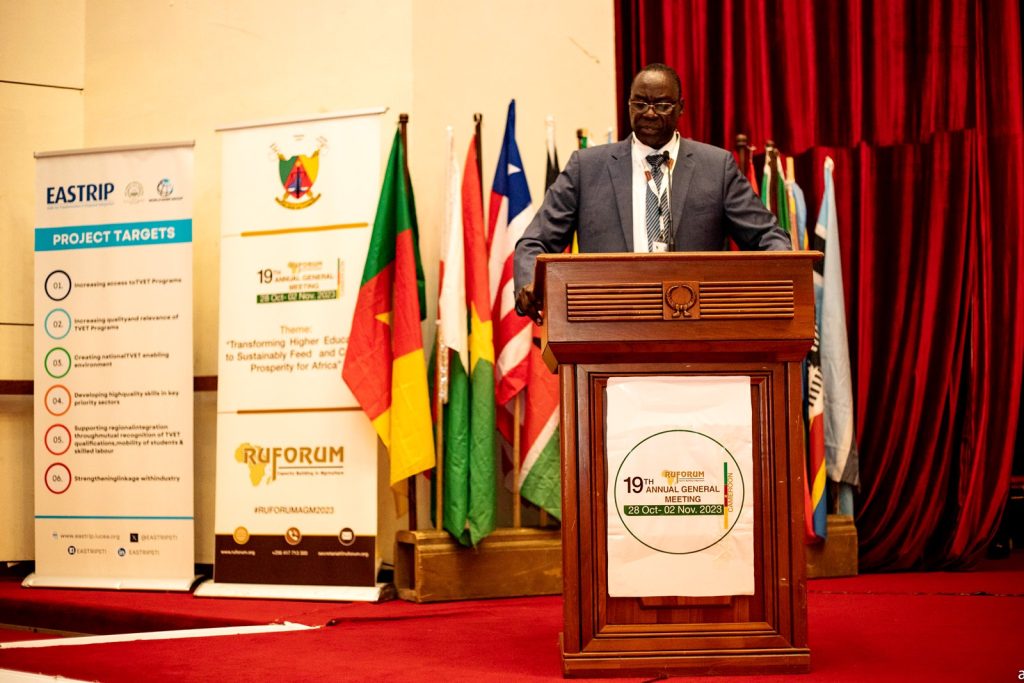
Reflecting on the AGM’s theme, Prof. Okori emphasized the need for Africa to become food secure when he said, “Africa must be an equal opportunity creator for the young generation, it must create wealth for its people and provide opportunities for the present and future and these are well summarized in agenda 2063. It is our collective duty therefore to turn these opportunities and actions into investment.”
According to him, the RUFORUM Network remains strong in building capacity and providing the necessary development solutions and opportunities. He noted that Africa generates about 10-12 million job entrants annually but the continent’s economy in its current configuration can only produce 3 million jobs. To him, for Africa to therefore reap from its demographic dividends, there is need to strengthen the paths to demographic transition of keeping young girls in school.
Prof. Okori also mentioned that RUFORUM is currently intensifying its inclusion and diversity targets. From 45%, the network has an ambitious target of at least 70%. “We must slow the rate at which girls give birth when young. It is the only way we are going to benefit from our population dividend,” he said.
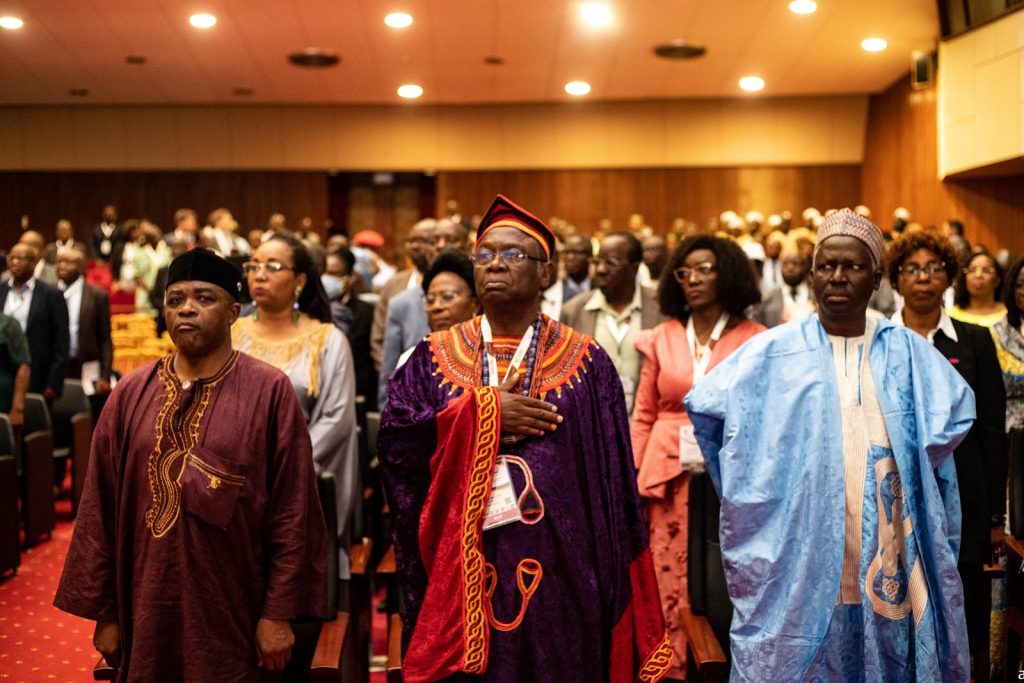
According to him, the higher degree needs for Africa is pretty dire. The World Bank recommends 10,000 PhDs to Africa. This can be compared to India whose signal population of 1. 4 billion registers 24000 PhDs a year. The pressure therefore on Africa’s side to intensify graduate training is real.
“Our graduate training in sciences therefore is one of the drivers to achieve this and it is the immense reason as to why in this meeting we have social and development partners. We are launching a journey with the Africa Development Bank that will bring us together as apex organizations in Africa to work together and solve our own challenges. However, as we do all these, we need to celebrate Africa. We should be recognizing and celebrating people who made what Africa is today,” he said.
Africa is informed by a number of important mutually interacting factors that collectively, are affecting the growth and progress of the continent. The economic outlook of the African continent in 2023 by the African Development Bank and other global apex development financial institutions was positive. However, Africa’s economic growth has since then decelerated, and is now projected to be lower than the previously projected rate of 4.1%.
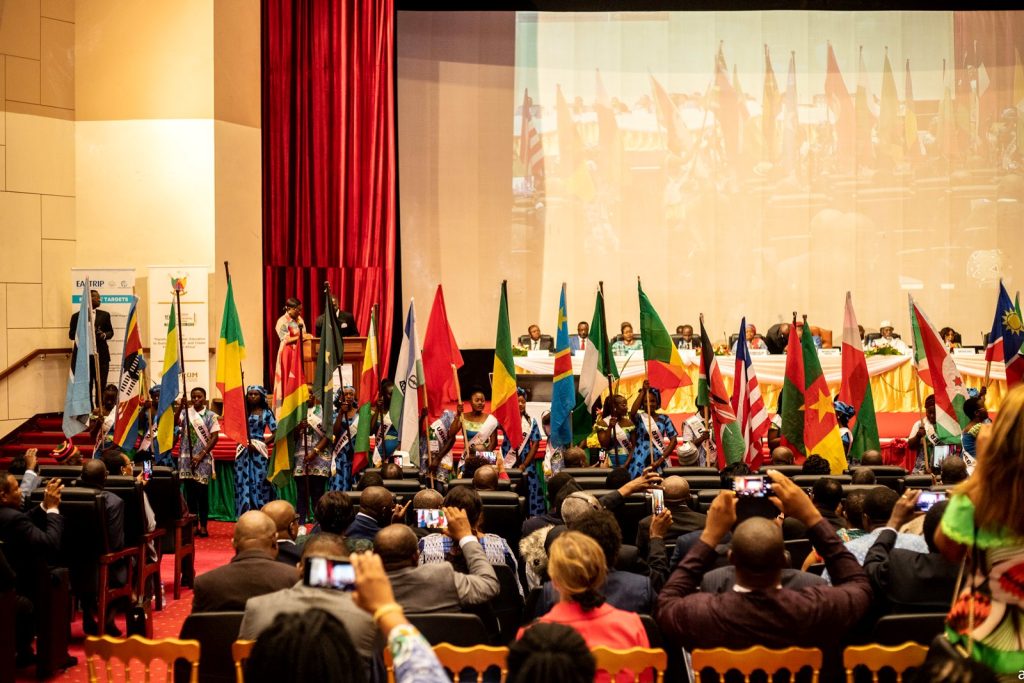
Agriculture a key sector, continues to be affected by both natural and human induced factors. It continues to face serious threats from climate. Studies by the United Nation’s Convention to Combat Desertification show that Africa accounts for 44% of severe droughts recorded globally in the last 50 years, causing economic losses of more than USD 70 billion. In 2022, an estimated loss of US$ 8.5 billion in economic damages was experienced due to climate change. Clearly, climate change and weather variability, remains one of the grand challenges of the 21st century for Africa and the World, because it affects key livelihood and strategic areas of emerging economies.
Unemployment facing Africa’s dominant demographic-the youth, raises questions about education, skilling and jobs creation while inclusion and diversity, the underpinning for an equal society, remains challenging. The question then to academia, researchers, development practitioners and policymakers is, “what step must we take right now to address the challenges to our current and future generations?”
“Our resounding response as RUFORUM is in line with what Malcolm X said many years ago, “Education and research for development are the passports to the future, for tomorrow belongs to those who prepare for it today,” said Prof. Partick Okori.
According to the Deputy Minister for Education in Malawi, Her Excellence Mdooko Nancy Chawola who represented the visiting ministers of RUFORUM partner countries, African countries should put in place vibrant resource mobilization mechanisms to collectively finance Africa’s education and support governments that are battling with competitive budgetary demands.
“For the universities to offer solutions for the challenges the continent is facing, there is need to rebuild the curriculum that responds to our current needs and not what we needed yesterday. Our respective countries are grappling with higher levels of unemployment, can investors assist by producing graduates with entrepreneurial skills so that they are able to employ themselves and others. Of course there will be need to put in place support mechanism for such graduates to take over,” she said.
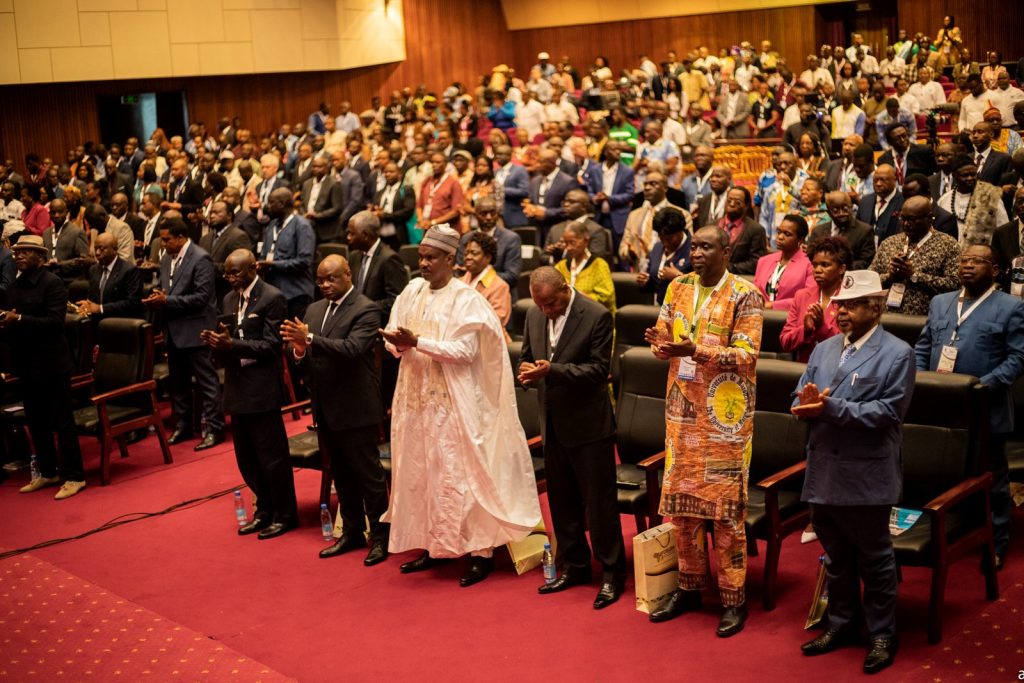
She equally acknowledged the national regulatory frameworks such as the Malawi Regulation Framework 2063 developed inline with the African Union Agenda 2063 the Africa we want, in which the continent aspires to be prosperous by 2063 through various means such as modernizing agricultural for increased production and productivity there by making people food secure.
She applauded RUFORUM’s efforts towards zero hunger in Africa through its vision 2030. According to Mdooko Nancy Chawola, food security is supposed be prerogative as well highlighted in the Sustainable Development Goal 2 (SDG 2) that is geared towards ending hunger, attaining food security, improving nutrition and promoting sustainable development.
In Cameroon, Agriculture and Education have been prioritized as drivers for economic growth and transformation. Through an agricultural flagship program initiated by His Excellence Paul Biya, science programmes and financial services as well as favorable ways of accessing market have been introduced in the country with the aim of transforming agricultural sector into a value added industrialized and integrated system engine of economic growth.
According to Prof. Ngomo Horace Manga- Vice Chancellor, University Buea, the government of Cameroon has resolved to grant its people with education that can help them manage their personal, national and Africa’s present and future economic destiny. In 2022, His excellence Paul Biya endorsed the recruitment process of 2000 lecturers in universities to ensure the quality of higher education in Cameroon.
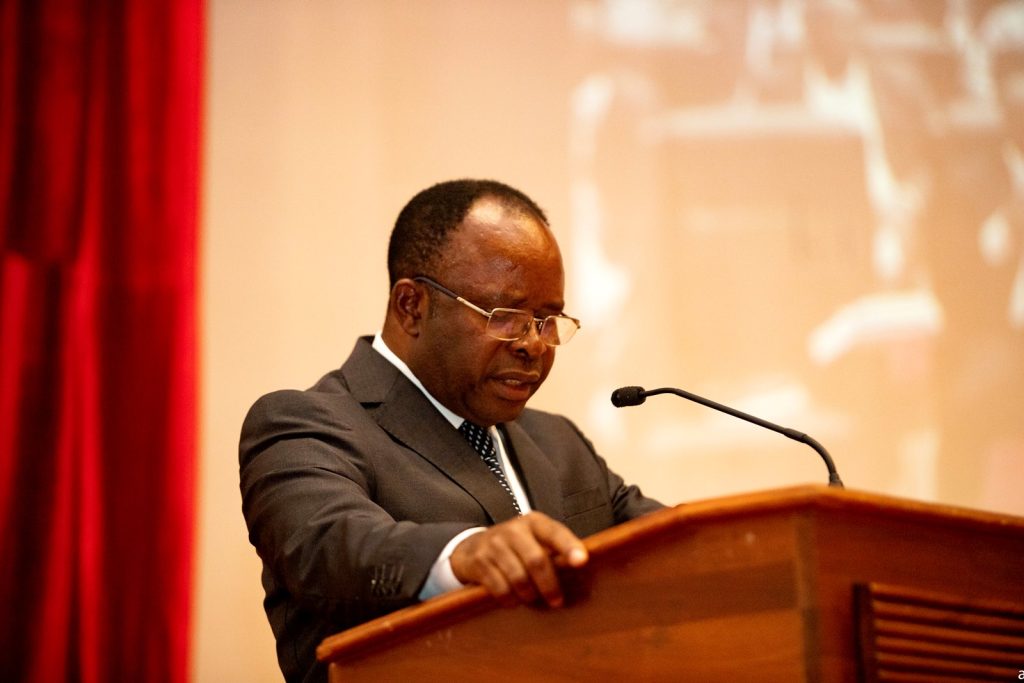
“Collectively these education reforms and investment actions affordably can transform the people of Cameroon into a strong emerging market. Cameroon carries the highest science female adoptive rate in sub-Saharan Africa at 73%. This is a strong result of government delivery of United Nations SDG 5 of achieving education and build human capital for the country,” he noted.
The Opening Ceremony for the 19th RUFORUM Annual General Meeting unlocked the floor for critical discussions and meetings throughout the week. At the same function, RUFORUM presented a contemporary painting to His Excellence Paul Biya, President of the United Republic of Cameroon in recognition of his outstanding, selfless and patriotic services s to the people of Cameroon and Africa at large.
On 25th October 2023, the RUFORUM Network equally participated in the Cameroon Higher Education Day, the first of its kind in the country.
You may like
-


Makerere Graduation Underscores Investment in Africa’s Public Health Capacity
-
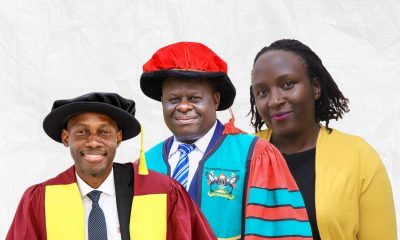

Three MakSPH Faculty Honoured with Makerere University Research Excellence Awards 2026
-


Makerere University commemorates 13 transformative years of partnership with Mastercard Foundation
-


Celebrating Academic Excellence: CoBAMS Presents 975 Graduands at Mak 76th Graduation Ceremony
-


CAES Presents Overall Best Performing Student in the Sciences & a Record 28 PhDs at the 76th Graduation Ceremony
-


Mak hosts First African Symposium on Natural Capital Accounting and Climate-Sensitive Macroeconomic Modelling
General
Makerere University commemorates 13 transformative years of partnership with Mastercard Foundation
Published
2 days agoon
March 2, 2026
On Friday, 27th February 2026, Makerere University proudly celebrated 13 years of a significant partnership with the Mastercard Foundation, a prestigious independent organisation headquartered in Toronto, Canada. Since its inception in 2013 with the launch of the Scholars Program-currently headed by Prof. Justine Namaalwa, this collaboration has grown significantly, expanding to include two additional initiatives: The E-learning Initiative-headed by Prof. Paul Muyinda Birevu and the Africa Climate Collaborative-headed by Prof. Gorretie Nabanoga. This long-term partnership underscores the shared commitment to fostering education, innovation, and sustainability in Uganda and across Africa.
The colourful event coincided with the 76th Graduation Ceremony, during which Makerere University honoured Ms. Reeta Roy, the Founding President and CEO of the Mastercard Foundation, with an honorary Doctor of Laws.

In her commencement speech, Ms. Roy thanked Makerere University for considering a partnership with the Mastercard Foundation and for conferring upon her a prestigious honorary award.
“Mastercard Foundation is honoured to collaborate with this esteemed university, and I appreciate the recognition through this award. I am excited to be associated with Makerere University and look forward to actively embodying its values. Joining the broader community of alumni from this distinguished institution is a privilege, and I am eager to contribute to its legacy,” stated Ms. Roy.

During the reception in honour of Ms. Roy, the Chairperson of Makerere University Council, Dr. Lorna Magara, acknowledged the invaluable support from the Mastercard Foundation. She emphasised the profound impact of the Foundation’s various initiatives, particularly the scholarships for disadvantaged youth, which enable them to access higher education and opportunities that might have otherwise been beyond their reach.
“On behalf of the Makerere University Council and the broader University community, I extend our sincere gratitude to Mastercard Foundation for its commitment to collaborating with Makerere University in various endeavours, especially for providing scholarships to our underprivileged young people who would never have stepped inside a lecture room at the University.” Dr. Magara stated.

Dr. Magara, in a special way, thanked Ms. Roy for her transformative leadership and unwavering commitment to supporting young people in Africa, citing her efforts to ensure young people get their voices heard.
“As a university, our business is with young people. We are therefore committed to providing the environment and education that deliver meaningful pathways. We will provide an environment that ensures young people have a voice and agency to create meaningful change in society.” Dr. Magara pledged.

Dr. Magara further congratulated Ms. Roy on her honorary Doctor of Laws from Makerere University, noting that it is the university’s highest honour for individuals who have excelled in their careers.
“On behalf of the Makerere University community, I would like to extend my heartfelt congratulations on your honorary Doctor of Laws. This esteemed recognition represents the highest honour our institution can bestow on individuals who have demonstrated exceptional achievement and excellence across various facets of their career.” Dr. Magara remarked.
Prof. Justine Namaalwa, the Program Director of the Mastercard Foundation Scholars Program and the Coordinator for all Mastercard Foundation Initiatives at Makerere University, expressed her appreciation for the thirteen-year collaboration between Makerere University and the Mastercard Foundation. She highlighted that the partnership had yielded significant, impactful results.

“In 2013, Makerere University partnered with the Mastercard Foundation to educate the next generation of transformative African leaders who can positively impact their lives, their communities, and the economies of Africa. The partnership has had a significant impact. I thank the University Management and the Foundation team for this visionary collaboration,” remarked Prof. Namaalwa.
Prof. Namaalwa articulated that the partnership with the Mastercard Foundation is primarily focused on empowering young people as agents of change for transformational leadership in Africa. She presented compelling statistics demonstrating the positive impact of the scholars’ program, highlighting the success of individuals who have completed their education and their subsequent professional experiences after university graduation.

“This partnership focuses on young people, aiming to create positive change in their lives. To date, the Scholars Program has graduated 974 alumni, with 48% securing formal employment, 18% starting their own businesses, 8% participating in internships, and 5% pursuing further education. Overall, 72% of Scholar alumni are actively engaged in employment or entrepreneurship,” Prof. Namaalwa stated.
The colourful event showcased a dynamic array of activities that highlighted the entrepreneurial spirit of Scholars and alumni from the Mastercard Foundation at Makerere University. Attendees enjoyed a mini-exhibition featuring innovative products from these ventures.

A video documentary illustrated the positive impact of the three Mastercard Foundation initiatives. The event also featured inspiring poetry recitations by Scholars and a lively atmosphere of music and dance, creating an engaging and memorable experience for all participants.
The high-level event was attended by senior University officials, led by the Chairperson of Council, Dr. Lorna Magara; the Vice-Chancellor, Prof. Barnabas Nawangwe; the Vice-Chancellor, Academic Affairs, Prof. Sarah Ssali, Deputy, and the Ag. Deputy Vice-Chancellor, Finance and Administration Prof. Winston Tumps Ireeta. Mr Yusuf Kiranda, the University Secretary; and Prof. Buyinza Mukadasi, the Academic Registrar, Chancellor Emeritus-Prof. Ezra Suruma, former Chairperson of the Steering Committee of Mastercard Foundation Scholars Program-Prof. Umar Kakumba, and the Deputy Executive Secretary, RUFORUM, and former Program Coordinator of the Scholars Program at Makerere University-Dr. Florence Nakayiwa, among many other officials graced the function.

The event was also graced by a high-level delegation from the Mastercard Foundation, led by Ms. Reeta Roy, the Founding President of the Foundation, and included the Mastercard Foundation Teams from the Country offices in Kigali, Nairobi, and Kampala; the Program partners; the Mentors, Scholars and alumni; as well as the Program staff of the three Mastercard Foundation Initiatives at Makerere University.
At the end of the event, Makerere University honoured Ms. Reeta Roy with University memorabilia, including a pencil-drawn portrait, a pencil-drawn photo of the Ivory Tower, and other Ugandan crafts. Ms. Roy cut a graduation cake together with the 10 graduates of the 76th graduation ceremony from the Mastercard Foundation Scholars Program.
Bernard Buteera is the Principal Public Relations Officer for the Mastercard Foundation Scholars Program at Makerere University.

It is with great pleasure that I welcome you to this edition of Mak News Magazine, a publication that continues to chronicle Makerere University’s journey as a centre of academic excellence, innovation, and societal transformation.
The stories featured in this issue vividly demonstrate Makerere’s unwavering commitment to addressing national, regional, and global challenges through research, partnerships, and people-centred solutions. They reflect a university that is deeply engaged with society, one that applies knowledge not only to advance scholarship, but also to improve lives.
A recurring theme in this edition is innovation for resilience and inclusion. From the College of Agricultural and Environmental Sciences’ Healthy Soy Initiative combating child malnutrition amid climate change, to the cutting-edge work of CEDAT’s Team Green Minds integrating IoT into agriculture, Makerere continues to harness science and technology to respond to pressing development needs. Equally inspiring is the College of Natural Sciences’ success in securing international funding to scale up fish processing technologies, with a deliberate focus on empowering women and strengthening livelihoods.
This issue also highlights Makerere’s growing role in advancing health and wellbeing. The launch of the Early Intervention Psychiatry Services Clinic at Makerere University Hospital marks an important step in strengthening mental health services, while the Hospital’s transformation from a modest sickbay into a centre of excellence stands as a testament to decades of strategic investment, dedication, and service to the nation.
Our commitment to education access and global engagement is equally evident. Strategic partnerships, such as that between the College of Education and External Studies and the Uganda Vocational and Technical Assessment Board, are expanding pathways to quality education. The establishment of the first-ever United States Studies Centre in the Great Lakes Region positions Makerere as a hub for dialogue, research, and policy engagement on global affairs. We also celebrate our vibrant international community, with graduates drawn from 67 nationalities—affirming Makerere’s status as a truly global university.
This edition further showcases initiatives that ensure long-term institutional sustainability, including the launch of the CoCIS Endowment Fund, infrastructure developments such as the modern hostel at Buyana Farm, and transformative programmes supported by the Mastercard Foundation that continue to empower young people across the continent.
As you read through these pages, I invite you to reflect on the collective effort of our students, staff, alumni, partners, and supporters whose contributions make these achievements possible. Together, we continue to shape Makerere University as a place where knowledge serves humanity.
I wish you an engaging and inspiring read.
Prof. Barnabas Nawangwe
VICE CHANCELLOR

The Board Chairperson of the Makerere University Endowment Fund (MakEF), Dr. Margaret Blick Kigozi, has urged graduands in Health and Life Sciences to uphold professional ethics and serve humanity with diligence and compassion.
Her appeal came during the passing out of graduates from the College of Natural Sciences (CoNAS), the College of Veterinary Medicine, Animal Resources and Bio-Security (CoVAB), the College of Health Sciences (CHS) and the School of Public Health (SPH) on Day Two of the 76th Graduation Ceremony of Makerere University.
“Class of 2026, you are now part of the Makerere legacy. Wherever you go clinics, laboratories, farms, boardrooms, or classrooms, you carry this institution with you. Serve your patients with skill and compassion. Care for animals and communities responsibly. Question boldly and keep learning,” Dr Kigozi, said.
Delivering the commencement address, Dr. Kigozi lauded the graduates for their dedication to careers that directly impact lives and communities. She encouraged them to use their knowledge generously and exercise their power gently.
“Your education has trained you to ask better questions. Your humanity must guide the answers. Never forget that behind every chart, every case, every animal, every experiment, there is life. And life deserves care, patience, and dignity. Give every person you come in contact with care, patience and dignity,” Dr Kigozi, noted.
As the graduates embark on their professional journeys, Dr. Kigozi emphasized the importance of cultivating basic business acumen and financial literacy to ensure sustainability in their work.

“You do not need to become accountants but you must be able to read the essentials: understand simple financial statements, budgets and key metrics so you can judge whether a clinic, lab, or program is sustainable. You are encouraged to start your business. There are numerous investment opportunities in your areas of training. You can provide services to our people and create jobs,” Dr Kigozi, said.
She shared candidly how, when she first stepped into leadership, she realised she did not understand balance sheets or budgets well enough. So, she returned to Makerere for short courses to strengthen herself.
“A well-run Hospital, clinic or lab delivers better outcomes, attracts staff, and secures funding. Business savvy is not only about profit, it’s about sustainability and the freedom to serve ethically and effectively. Carry clinical skill with business sense so your work endures and grows,” Dr. Kigozi, noted.
Quoting renowned writer and producer Shonda Rhimes, creator of Grey’s Anatomy, who once reflected that succeeding in one area of life can sometimes mean falling short in another, Dr. Kigozi encouraged women graduates to intentionally balance professional ambition with family responsibilities.
“When one area thrives, another is often under strain. When Navio was graduating from school I had to manage the Presidential Investor Round Table on the same day as Executive Director Uganda Investment Authority. I chose my job and delegated his siblings to attend Navios graduation. I learnt from this. I choose family always after that thing you achieve once and keep forever,” Dr Kigozi, said.
In his speech, the Prof Barnabas Nawangwe, the Vice Chancellor, informed the congregation that Makerere’s ranking on all university ranking platforms has remained stable, placing Makerere among the top 10 African universities and within the top 4.5% globally.
“In the Times Higher Education global ranking, Makerere University made a formidable jump from the 1200-1500 bracket to the 800-1000 bracket. This was no mean achievement and I congratulate all members of the Makerere Community on this stellar performance,” Prof Nawangwe, said.
Trending
-

 Humanities & Social Sciences1 week ago
Humanities & Social Sciences1 week agoMeet Najjuka Whitney, The Girl Who Missed Law and Found Her Voice
-

 General1 week ago
General1 week ago76th Graduation Highlights
-

 Health2 weeks ago
Health2 weeks agoUganda has until 2030 to end Open Defecation as Ntaro’s PhD Examines Kabale’s Progress
-

 Agriculture & Environment2 weeks ago
Agriculture & Environment2 weeks agoUganda Martyrs Namugongo Students Turn Organic Waste into Soap in an Innovative School Project on Sustainable Waste Management
-

 General2 weeks ago
General2 weeks agoMastercard Foundation Scholars embrace and honour their rich cultural diversity
